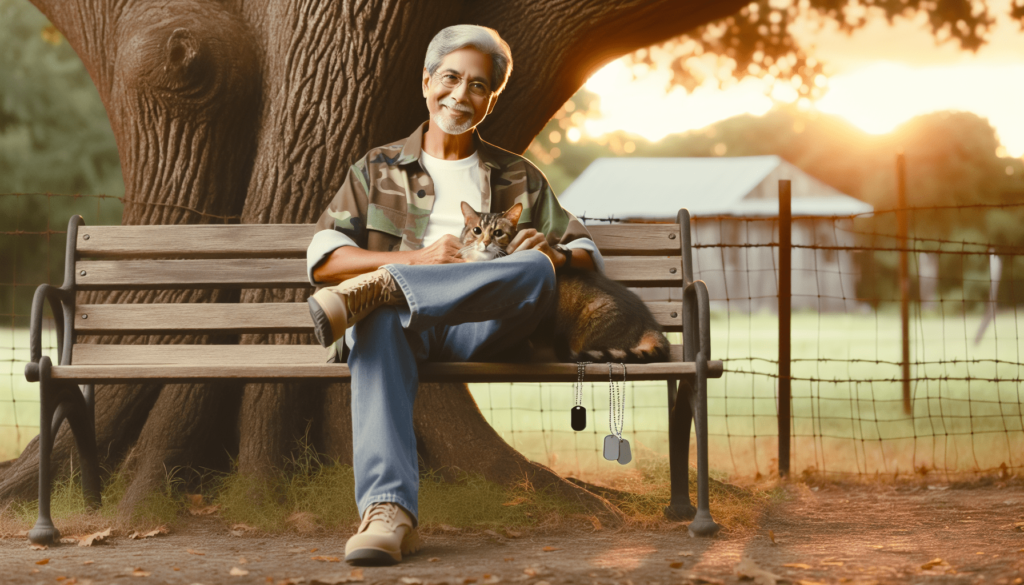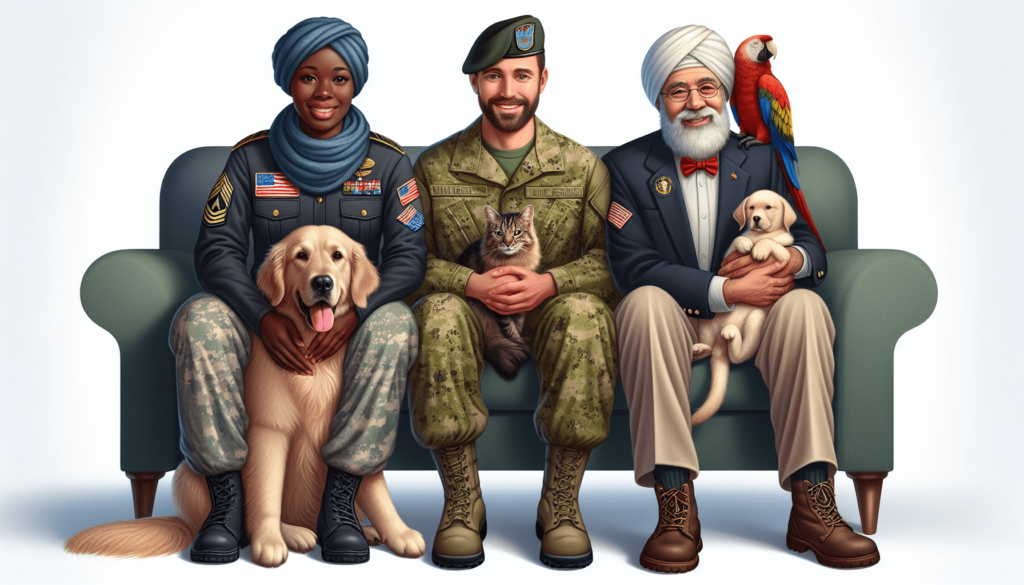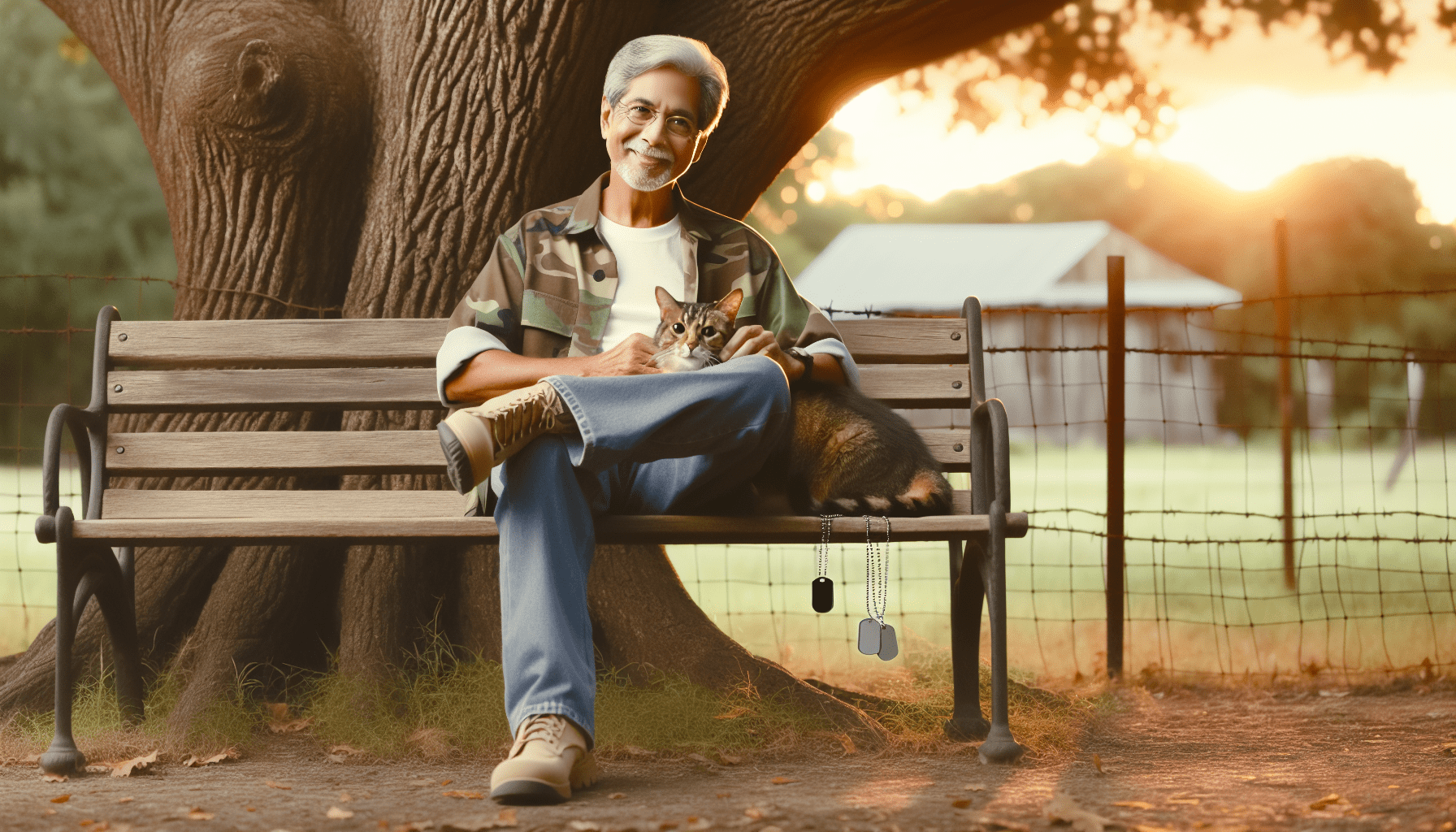Pets have always been known for their ability to bring comfort and companionship to those in need, and for veterans, this couldn’t be truer. In fact, the benefits that pets can have on the lives of veterans are truly remarkable. From reducing stress and anxiety to providing unconditional love and support, pets have the power to positively impact the mental and emotional well-being of veterans in countless ways. Whether it’s a loyal dog, a cuddly cat, or a soothing aquarium, having a pet by your side can make all the difference in the world for veterans as they navigate the challenges and transitions of post-military life.
Supporting Mental Health
Reducing symptoms of PTSD
Pets can have a profound impact on reducing symptoms of post-traumatic stress disorder (PTSD) in veterans. Many veterans who have experienced traumatic events during their service may suffer from anxiety, hypervigilance, and intrusive thoughts. However, the presence of a pet, such as a dog or a cat, can help alleviate these symptoms. Pets offer unconditional love and support, creating a sense of security and comfort that helps veterans cope with their PTSD. The companionship of a pet provides a calming effect, helping to reduce stress and anxiety levels.
Decreasing feelings of anxiety and depression
Veterans often struggle with feelings of anxiety and depression as a result of their military experiences. Pets can greatly help in reducing these symptoms and improving mental well-being. The simple act of petting a dog or cat can release endorphins, which are known to improve mood and decrease stress levels. Additionally, having a pet provides a sense of purpose and responsibility, helping veterans focus on something positive and care for another living being. The presence of a pet can also help alleviate feelings of loneliness and provide a source of emotional support, which can be particularly beneficial for veterans who may feel isolated.
Improving Physical Health
Increasing physical activity
Many veterans may struggle with maintaining an active lifestyle, which can have negative effects on their physical health. However, owning a pet can encourage veterans to engage in regular physical activity. Dogs, in particular, require daily exercise such as walking or playing fetch. By taking their dog for walks, veterans can establish a routine of physical activity that not only benefits the pet but also improves their own cardiovascular health. Regular exercise can lower the risk of obesity, heart disease, and other health conditions, ultimately promoting overall well-being.
Lowering blood pressure and heart rate
Interacting with pets has been shown to have a positive impact on blood pressure and heart rate. Spending time with a pet, such as stroking their fur or talking to them, can activate the release of oxytocin, a hormone that helps reduce stress and lower blood pressure. Moreover, the rhythmic nature of petting a dog or cat can have a calming effect on the body, helping to regulate heart rate and induce relaxation. These physiological changes contribute to improved cardiovascular health and overall physical well-being for veterans.

Providing Companionship
Alleviating feelings of loneliness and isolation
After returning from service, veterans may experience feelings of loneliness and isolation due to various reasons, including a lack of social connections and difficulty readjusting to civilian life. Pets can offer consistent companionship and alleviate these feelings. Dogs and cats, in particular, are known for their loyalty and unconditional love. They provide a constant presence and emotional support, making veterans feel less alone and isolated. The companionship of a pet can also encourage veterans to engage in social activities and develop new friendships.
Promoting social interaction
Pets can serve as amazing social facilitators for veterans. Owning a pet can create opportunities for social interaction in various settings. For instance, taking a dog for a walk can lead to conversations with other pet owners in the neighborhood, fostering a sense of community and increasing social connections. In addition, there are numerous veteran support groups and organizations centered around pets, creating a common ground for veterans to meet and connect with like-minded individuals. Through these social interactions, veterans can find understanding, support, and a sense of belonging.
Enhancing Emotional Well-being
Boosting mood and improving overall happiness
Studies have shown that interacting with pets can significantly boost mood and improve overall happiness. Pets provide companionship and unconditional love, which can have a profound positive impact on an individual’s emotional well-being. Simply being in the presence of a pet, whether it’s playing with them or cuddling, can elevate levels of serotonin and dopamine, neurotransmitters responsible for feelings of happiness and well-being. The joy and laughter that pets bring into the lives of veterans can contribute to a more positive outlook and increased emotional resilience.
Helping to cope with emotional challenges
Veterans often face emotional challenges both during and after their service. Pets can play a vital role in helping them cope with these challenges. The presence of a pet can provide a source of comfort and emotional support during difficult times. Pets offer a non-judgmental listening ear, allowing veterans to express their emotions freely without fear of criticism or rejection. Furthermore, the act of caring for a pet can give veterans a sense of purpose and responsibility that can help them focus on something positive and distract from negative thoughts or emotions.

Reducing Stress
Promoting relaxation and stress reduction
Pets have a remarkable ability to promote relaxation and reduce stress levels in veterans. The act of petting a dog or cat has been shown to release oxytocin, a hormone that triggers feelings of calmness and contentment. The rhythmic motion and soothing presence of a pet can help veterans relax and unwind, particularly during times of heightened stress or anxiety. Pets also provide a sense of security and comfort, creating a safe space where veterans can let go of their worries and find solace in their furry companions.
Creating a sense of purpose and responsibility
Having a pet gives veterans a sense of purpose and responsibility, which can be incredibly beneficial in reducing stress levels. Pets rely on their owners for food, exercise, and companionship, establishing a routine and structure in the veterans’ lives. This sense of responsibility not only provides a distraction from stressors but also creates a sense of purpose and accomplishment. By caring for their pets, veterans can experience a sense of fulfillment and gain a renewed sense of self-worth.
Improving Communication Skills
Facilitating communication and social skills
For veterans who may struggle with communication and social skills, owning a pet can be highly beneficial. Pets provide a safe and non-judgmental environment where veterans can practice and improve their communication skills. Talking to their pets can help veterans develop confidence in expressing their thoughts and emotions, which can translate into improved communication with others. Furthermore, pets offer a listening ear without interruption or judgment, allowing veterans to open up and share their experiences more freely.
Enhancing non-verbal communication abilities
Pets communicate through non-verbal cues, such as body language and facial expressions. Interacting with pets can help veterans improve their non-verbal communication abilities. By observing their pets’ behaviors, veterans can learn to interpret non-verbal signals more effectively. This increased understanding of non-verbal communication can have a positive impact on their interactions with other people, improving their ability to perceive and respond to social cues. Learning to read and respond to non-verbal communication can greatly enhance veterans’ overall communication skills and help them navigate social situations with more ease.
Enhancing Self-esteem and Confidence
Providing a sense of accomplishment and purpose
Caring for a pet can instill a sense of accomplishment and purpose in veterans. Successfully meeting the needs of a pet, such as providing food, exercise, and grooming, can boost self-esteem and self-worth. By taking on the responsibility of caring for another living being, veterans can experience a sense of fulfillment and achievement. This sense of accomplishment can have a positive impact on their self-esteem, helping them build confidence and a more positive self-image.
Building self-confidence and self-worth
The unwavering love and support that pets offer can have a transformative effect on veterans’ self-confidence and self-worth. Pets do not judge or critique their owners; instead, they provide constant companionship and affection. This unconditional love can help veterans see themselves in a more positive light and believe in their own worth. The bond and connection formed with a pet can foster a sense of self-acceptance and confidence, empowering veterans to face challenges and overcome obstacles with greater resilience.
Encouraging Routine and Structure
Establishing a daily routine
Pets thrive on routine, and this can be highly beneficial for veterans as well. Establishing a daily routine centered around caring for a pet can provide structure and stability in veterans’ lives. Having a set schedule for feeding, exercise, and other pet-related activities can help veterans organize their days and create a sense of predictability. Routine can be particularly important for veterans who may struggle with adapting to civilian life or find it challenging to establish a new routine. Pets can serve as catalysts for establishing healthy habits and maintaining a structured lifestyle.
Creating a sense of stability and predictability
The presence of a pet can create a sense of stability and predictability in veterans’ lives. Pets offer a constant presence and routine, helping veterans feel grounded and anchored. The reliability of a pet’s needs, such as feeding and exercise, can provide a sense of stability in an ever-changing world. Additionally, the unconditional love and loyalty of a pet offer a source of comfort, reinforcing the feeling of security and creating a stable emotional foundation. This stability and predictability can be instrumental in helping veterans navigate the challenges of daily life and maintain overall well-being.
Assisting with Post-Deployment Transition
Easing the transition back into civilian life
The transition from military to civilian life can be challenging for veterans, with various adjustments and uncertainties. Pets can play a significant role in easing this transition. The presence of a pet offers a familiar and comforting element during times of change and uncertainty. Pets provide a constant source of companionship and emotional support, helping veterans feel more at ease and connected to their new civilian environment. The bond formed with a pet can act as a bridge between the military and civilian worlds, offering a sense of continuity and stability.
Helping to adapt to new routines and environments
Veterans often need to adapt to new routines and environments after their deployment. Pets can help facilitate this transition by providing a sense of familiarity and routine in the unfamiliar. Caring for a pet requires establishing new habits and adapting to new surroundings, which can help veterans adjust to their new reality. Pets can provide a consistent presence and stability, making the process of adapting to a new routine and environment more manageable. The responsibility of pet ownership can aid in the development of new routines and provide a sense of purpose during times of change.
Offering Unconditional Love and Support
Providing a non-judgmental and unwavering bond
Pets offer an extraordinary bond of unconditional love and support to veterans. Regardless of their past experiences or shortcomings, pets accept veterans without judgment or prejudice. This unwavering bond can be especially comforting for veterans who may have faced rejection or judgment in the past. Pets provide a safe and secure relationship, free from the complexities of human interactions. The presence of a pet can remind veterans that they are worthy of love and affection, fostering a sense of belonging and acceptance.
Offering constant companionship and loyalty
One of the most cherished benefits of owning a pet for veterans is the constant companionship and loyalty they provide. Pets are always there, ready to offer their love and support. They provide a presence that veterans can rely on, offering a consistent source of comfort and solace. The loyalty of a pet can be incredibly reassuring in times of distress or hardship, reminding veterans that they are never alone. The enduring bond formed with a pet can bring immeasurable joy and fulfillment to veterans’ lives, enhancing their overall well-being and quality of life.

